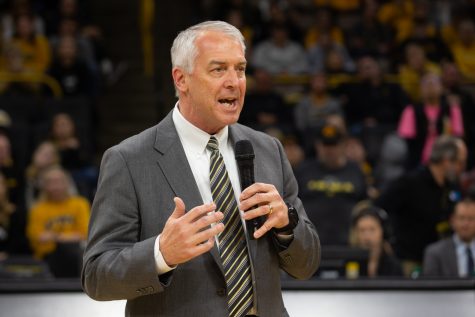Opinion | A total campus shutdown is not the answer
Some students need the resources campus provides – the University needs to do everything it can before shutting down campus to help them.
The Old Capital is seen on Tuesday, September 18, 2018.
September 9, 2020
Since the return of students to campus, University of Iowa has 1,395 cases of COVID-19. Poor administration decisions, irresponsible behavior of students, and inadequate measures and policies to slow the spread have all contributed to make not only the university, but Iowa City unsafe. Although a temporary move to online classes is needed, a total campus shutdown just like spring semester is not the answer.
Shutting down campus is unfair to students following policies, and not everyone has access to resources like the internet at home in order to complete their school work. Instead, the university needs implement new strategies to help stop the spread.
Before making the decision to shut down campus the university needs to invest in testing, issue consequences for reckless behavior, and lay out better policies in order to improve the spike in cases.
First, there needs to be an investment to create weekly testing for students and faculty.
Right now, the University is only testing people who have symptoms or if they have been in close contact with a positive case.
Many other schools such as University of Illinois require their students and faculty to get tested twice per week. The UI has said that widespread testing is not recommended by Johnson County or the Centers for Disease Control and Prevention, and will create a false sense of security for those who test negative in one snapshot of time.
In an interview with the National Public Radio, Martin Burke, a chemistry professor at the University of Illinois, says that ‘fast and frequent is the key’ and that their saliva-based tests allow quick results which allows the school to isolate positive cases quicker rather than waiting for them to develop symptoms.
Creating a system that implements weekly testing will allow cases to be caught quicker which allows self-isolation immediately and reduces the exposure to other members of the community.
In addition, the lack of weekly testing allows asymptomatic cases to be neglected and the absence of self-isolation will only increase the amount of exposure and potential cases across campus.
In addition to testing, the University has to enforce the current policies and go through with issuing consequences to those who are failing to follow guidelines.
Although bars in Iowa City are closed, that doesn’t stop students from hosting or attending parties. The University has an online form for ‘expressing concerns’ about people who haven’t followed the guidelines, but that’s not enough.
One area where it needs to be cracked down on is Greek Life. While recruitment has been moved to an online format, large gatherings are still occurring right under the university’s nose.
At other colleges such as New York University, administration has set an example of suspending over 20 students as of Sept. 5 for disregarding COVID-19 policies. Closer to Iowa, the University of Illinois has suspended two students and one fraternity for violating COVID-19 regulations.
Instead of relying on constant reprimands and warnings, the university needs to follow these examples and start issuing severe consequences such as suspension for breaking policies.
The only way that students will take these measures seriously is if they see that their peers have to take responsibility for their actions. Warnings only allow students to get away with their actions and keep repeating their irresponsible behavior.
While the university should move to online temporarily, they should not make any drastic decisions such as shutting down campus prior to issuing severe consequences for irresponsible behavior, implement weekly testing, and changing policy to help stop the spread.
Columns reflect the opinions of the authors and are not necessarily those of the Editorial Board, The Daily Iowan, or other organizations in which the author may be involved.

















